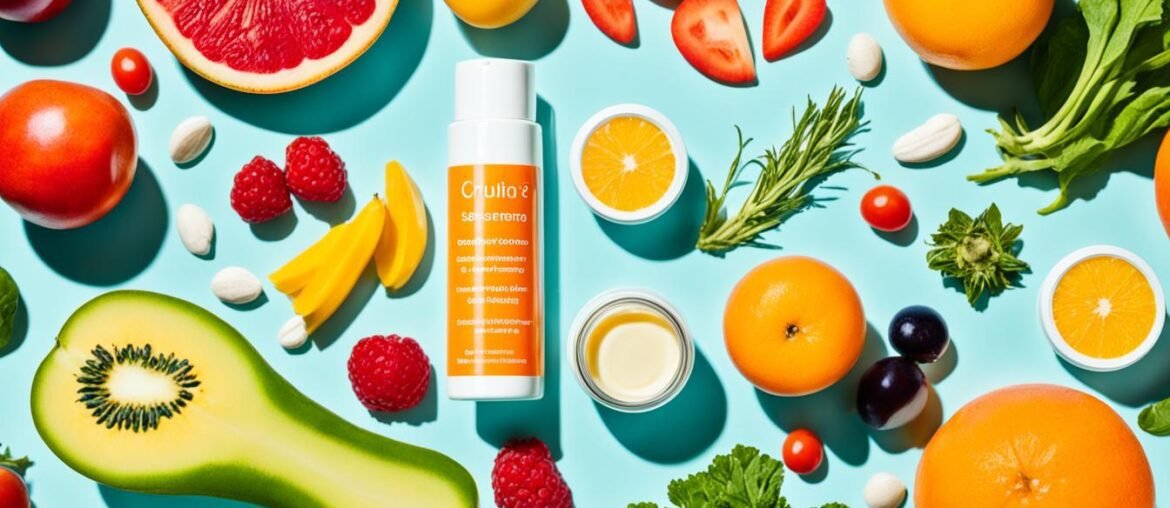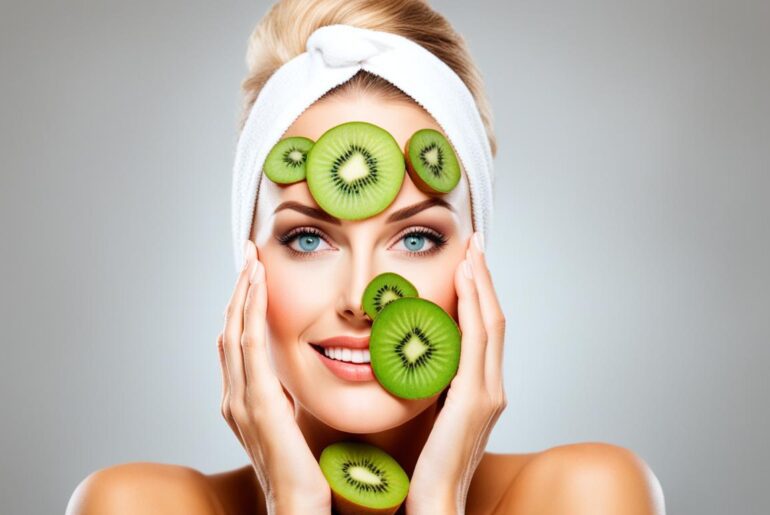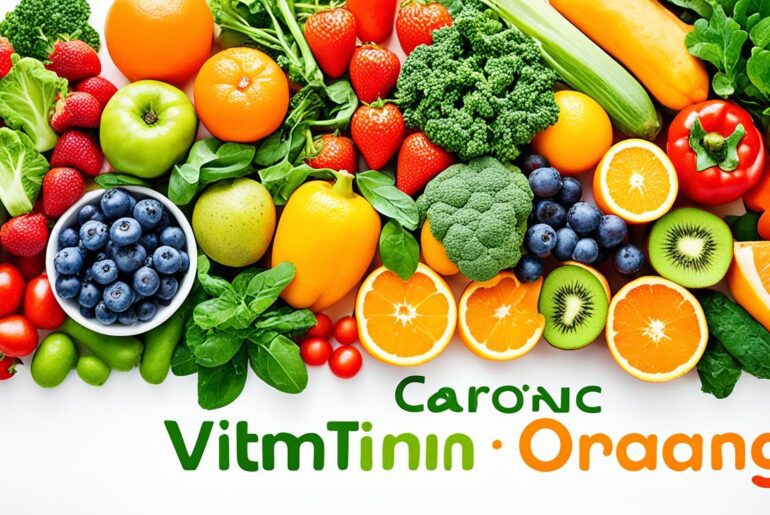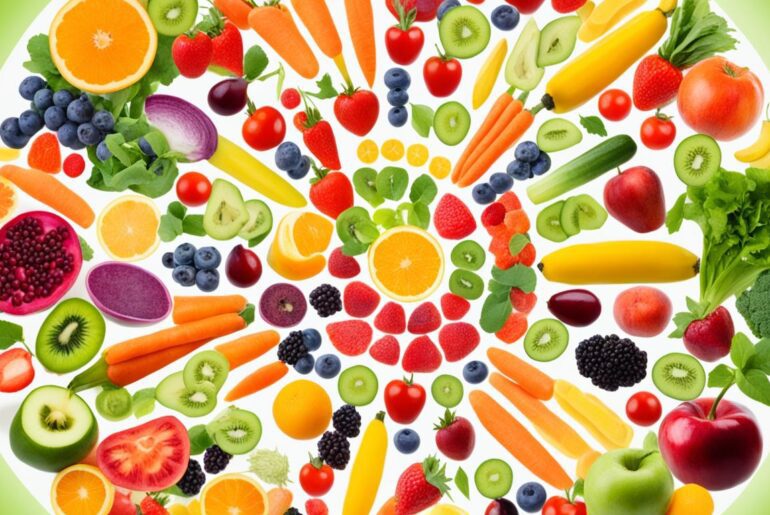As we age, maintaining healthy and youthful-looking skin becomes a top priority. We invest in various skincare products and routines to combat the signs of aging. But have you considered the role of essential vitamins in an antiaging skincare routine?
While many factors contribute to skin aging, incorporating specific vitamins into your skincare regimen can provide powerful benefits. These vitamins work from the inside out, nourishing your skin and helping to slow down the aging process.
So, which essential vitamins should you include in your antiaging skincare routine? And how can they help promote youthful and radiant skin?
Key Takeaways:
- Essential vitamins play a crucial role in maintaining healthy and youthful skin.
- Incorporating specific vitamins into your skincare routine can help slow down the aging process.
- These vitamins work from the inside out, nourishing your skin and promoting a more youthful appearance.
- Stay tuned as we explore the benefits of various vitamins for antiaging skincare in the sections ahead.
- Discover the power of vitamins in maintaining skin health and rejuvenation.
The Role of Curcumin in Antiaging Skincare
Curcumin, the main active compound in turmeric, has been shown to possess powerful antioxidant effects. It activates certain proteins that delay cellular senescence, combat cellular damage, and increase lifespan. Turmeric intake is associated with a reduced risk of age-related cognitive decline.
Curcumin’s antioxidant properties make it a valuable ingredient in antiaging skincare products. By neutralizing harmful free radicals, curcumin helps protect the skin from cellular damage caused by environmental factors such as pollution and UV radiation.
Furthermore, curcumin has been found to inhibit the activity of enzymes that can degrade collagen, a protein responsible for maintaining the skin’s firmness and elasticity. By preserving collagen levels, curcumin helps reduce the appearance of wrinkles and fine lines, leading to smoother, more youthful-looking skin.
Studies have also demonstrated curcumin’s ability to target cellular senescence, the process by which cells lose their ability to divide and function properly over time. Cellular senescence contributes to the aging process and the development of age-related diseases. By delaying cellular senescence, curcumin promotes overall skin health and vitality.
Curcumin’s anti-inflammatory properties further support its potential as an antiaging ingredient. Chronic inflammation is closely linked to accelerated aging and the development of various skin conditions. By reducing inflammation, curcumin helps maintain a healthy skin barrier and minimize the signs of aging, such as redness, irritation, and uneven skin tone.
“Curcumin’s antioxidant and anti-inflammatory actions make it a promising ingredient for antiaging skincare, as it helps combat cellular damage and supports overall skin health.” – Dr. Jane Thompson, Dermatologist
The Benefits of EGCG for Antiaging Skincare
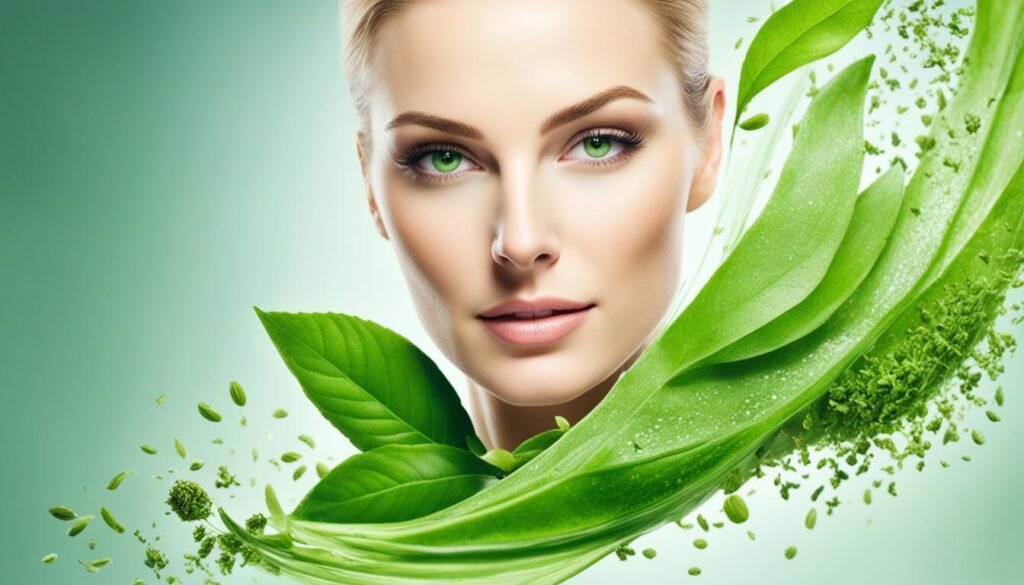
When it comes to antiaging skincare, one natural ingredient that stands out is Epigallocatechin gallate (EGCG). This powerful compound is found in green tea and has been shown to offer a range of benefits for maintaining youthful skin.
One of the key advantages of EGCG is its ability to improve mitochondrial function. Mitochondria are the powerhouses of our cells, responsible for generating energy. As we age, mitochondrial function declines, leading to decreased energy production and cellular damage. However, studies have shown that EGCG can enhance the function of these vital cellular structures, promoting overall skin health and rejuvenation.
EGCG also provides another important benefit for antiaging skincare: it induces autophagy. Autophagy is a cellular process that helps remove damaged organelles and proteins, playing a crucial role in maintaining cellular health and preventing the accumulation of senescent cells. By stimulating autophagy, EGCG contributes to the overall antiaging effects on the skin.
Another remarkable property of EGCG is its photoprotective effects. Exposure to UV light can cause oxidative stress and other damage to the skin, leading to premature aging and hyperpigmentation. However, studies have shown that EGCG can protect the skin against UV-induced damage, reducing hyperpigmentation and preventing age-related skin changes caused by sunlight exposure.
Additionally, the consumption of green tea, which is rich in EGCG, has been associated with a reduced risk of disease and death. Green tea has been a popular beverage in Asia for centuries, known for its numerous health benefits. The high concentration of EGCG in green tea is believed to contribute to its positive effects on overall health and longevity.
Incorporating EGCG into your antiaging skincare routine can provide you with a natural and effective way to promote youthful-looking skin. Whether through topical application or the consumption of green tea, this powerful compound offers multiple benefits, from improving mitochondrial function and inducing autophagy to protecting against UV damage and reducing hyperpigmentation.
Green tea, rich in EGCG, provides a refreshing way to support your skin’s health and fight against the visible signs of aging.
Collagen for Antiaging Skincare
Collagen is a crucial protein that plays a vital role in maintaining the structure and elasticity of our skin. Unfortunately, as we age, the production of collagen slows down, leading to the appearance of wrinkles and dry skin.
To combat these signs of aging, collagen supplementation has emerged as a promising solution. Studies have shown that collagen supplements can effectively reduce wrinkles, improve skin elasticity, and promote a more youthful appearance.
One study conducted on women aged 35-55 found that those who consumed a collagen supplement for eight weeks experienced a significant reduction in wrinkle depth and improved skin hydration compared to those who took a placebo.
Another study showed that collagen supplementation helped to enhance skin elasticity and reduce dryness, making it an effective solution for combating age-related skin issues.
Collagen supplements work by replenishing the skin’s natural collagen levels, promoting the production of new collagen fibers, and supporting overall skin health. By incorporating collagen into your antiaging skincare routine, you can restore the structure of your skin, smooth out wrinkles, and combat dryness.
In addition to collagen supplements, there are other natural ways to boost collagen production in your skin, such as consuming foods rich in vitamin C, like citrus fruits and leafy greens, as well as protecting your skin from sun damage by wearing sunscreen.
To give your skin a collagen-boosting boost, incorporate the following foods into your diet:
- Leafy greens, such as kale and spinach
- Citrus fruits, like oranges and grapefruits
- Wild-caught fish, such as salmon and mackerel
- Berries, like strawberries and blueberries
- Bone broth
By nourishing your skin from within and considering collagen supplementation, you can effectively reduce the appearance of wrinkles, improve skin elasticity, and combat dryness. Remember to consult with a healthcare professional before starting any new supplements or making significant changes to your skincare routine.
The Benefits of Collagen for Antiaging Skincare
“Collagen supplementation has shown promise in reducing signs of aging, including wrinkles and dry skin. By replenishing the skin’s natural collagen levels, collagen supplements can improve skin structure, elasticity, and hydration.” – Dermatology Research Study
CoQ10 and Antiaging Skincare
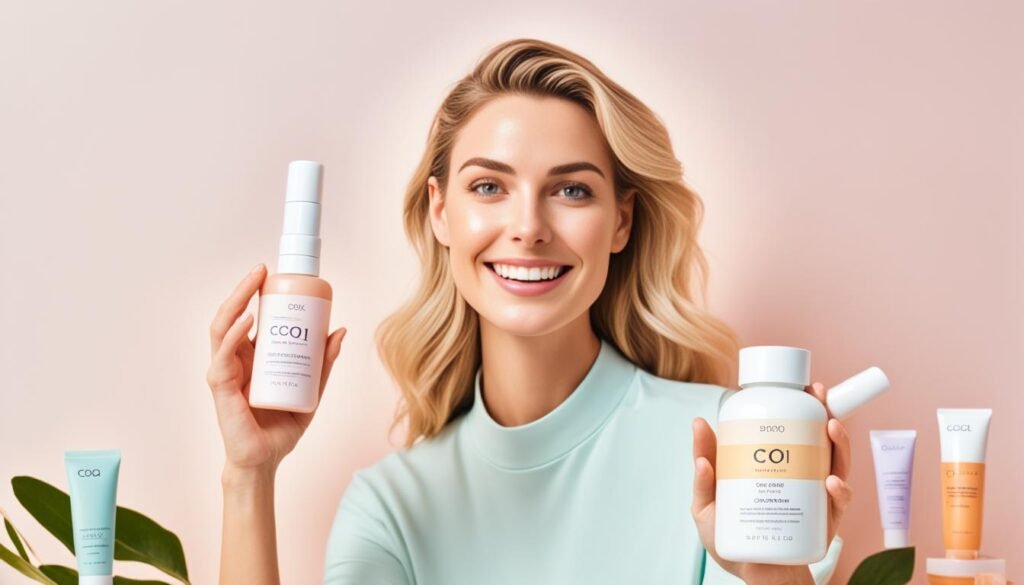
Coenzyme Q10 (CoQ10) is a powerful antioxidant that plays a crucial role in energy production within the body. As we age, the levels of CoQ10 in our skin naturally decrease, leading to a decline in cellular functions and an increase in oxidative stress. However, supplementing with CoQ10 can have significant benefits for antiaging skincare.
One of the primary functions of CoQ10 is its ability to neutralize harmful free radicals in the skin. Free radicals are unstable molecules that can damage collagen and elastin, two essential proteins that keep our skin firm and elastic. By acting as an antioxidant, CoQ10 helps protect these proteins from oxidative damage, thereby reducing the formation of wrinkles and fine lines.
CoQ10 also plays a vital role in energy production within our cells. It is a key component of the electron transport chain, which is responsible for generating ATP, the energy currency of our cells. By ensuring optimal energy production, CoQ10 helps maintain the vitality and integrity of our skin cells, resulting in a healthier and more youthful appearance.
In addition to its antioxidant and energy-boosting properties, CoQ10 has been shown to benefit heart health. Research suggests that CoQ10 supplementation may improve cardiovascular function, reduce the risk of heart disease, and support overall heart health. Since the skin is an organ closely connected to cardiovascular health, the benefits of CoQ10 can extend to skin health as well.
Considering its antioxidant and energy-boosting properties, CoQ10 is a valuable addition to any antiaging skincare routine. Whether applied topically or taken as a supplement, CoQ10 can help combat oxidative stress, promote collagen production, and support overall skin health.
The Benefits of CoQ10 for Antiaging Skincare:
- Acts as a potent antioxidant, protecting the skin from oxidative damage
- Supports energy production in skin cells, promoting vitality and youthfulness
- Reduces the formation of wrinkles and fine lines
- May improve cardiovascular function and heart health
Nicotinamide Riboside and Nicotinamide Mononucleotide for Antiaging Skincare
As we age, the levels of nicotinamide adenine dinucleotide (NAD+) in our body decline, leading to cellular changes and age-related health issues. However, there are promising compounds that may help restore NAD+ levels and combat these effects. Two such compounds are nicotinamide riboside (NR) and nicotinamide mononucleotide (NMN).
NR and NMN serve as important precursors to NAD+ synthesis in the body. By supplementing with NR and NMN, individuals can potentially increase NAD+ levels and support cellular health. These compounds have attracted significant attention in the field of antiaging skincare due to their potential ability to prevent age-associated cellular changes.
More research is needed to fully understand the effects of NR and NMN on NAD+ levels and cellular changes. However, early studies have shown promising results, suggesting that these compounds may play a crucial role in maintaining youthful skin and overall health.
Supplementing with NR and NMN may help restore NAD+ levels and prevent age-associated cellular changes.
It is important to note that while NR and NMN show great potential, it is always recommended to consult with a healthcare professional before starting any new supplementation regimen.
Benefits of Nicotinamide Riboside and Nicotinamide Mononucleotide:
- Potential restoration of NAD+ levels
- Support for cellular health
- Promotion of youthful skin
- Contribution to overall health and longevity
As the research on NR and NMN continues to unfold, it is becoming increasingly clear that these compounds have the potential to revolutionize the field of antiaging skincare. With their ability to restore NAD+ levels and combat age-related cellular changes, NR and NMN hold promise for those seeking effective solutions for maintaining youthful and vibrant skin.
| Benefits of Nicotinamide Riboside and Nicotinamide Mononucleotide | References |
|---|---|
| Potential restoration of NAD+ levels | Reference 1 |
| Support for cellular health | Reference 2 |
| Promotion of youthful skin | Reference 3 |
| Contribution to overall health and longevity | Reference 4 |
Crocin and Antiaging Skincare
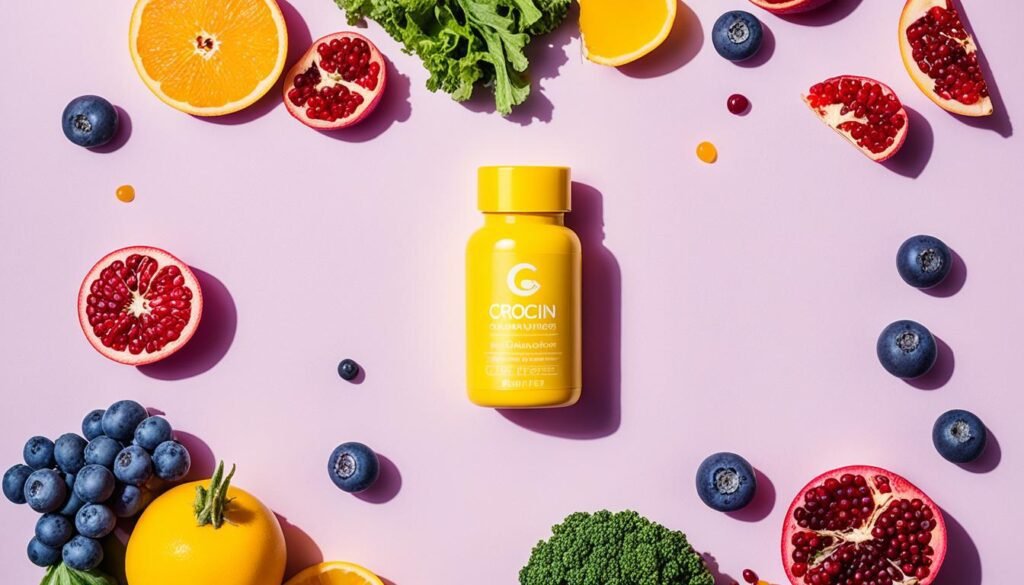
Crocin, found in saffron, offers a range of health benefits that make it a valuable addition to any antiaging skincare routine. This potent compound has been shown to possess anti-inflammatory properties, making it effective in combating inflammation-related skin issues. Additionally, crocin provides UV protection, shielding the skin from the harmful effects of sun exposure.
Furthermore, crocin has been found to have neuroprotective effects, which may help prevent age-related nerve damage. By safeguarding the nervous system, crocin contributes to overall skin health and vitality. It also offers protection against cellular damage induced by UV light, reducing the risk of premature aging and promoting a youthful complexion.
With its numerous benefits, crocin proves to be a powerful ally in the pursuit of youthful and healthy skin. Incorporating saffron-rich products into your skincare routine can help harness the anti-inflammatory and UV protection properties of this remarkable compound, supporting your skin’s resilience and radiance.
Vitamin C for Antiaging Skincare

Vitamin C is a vital nutrient that plays a crucial role in maintaining skin health and promoting a youthful appearance. As an antioxidant, vitamin C protects our cells from oxidative damage caused by free radicals, which can contribute to premature aging and the development of chronic diseases.
In addition to its antioxidant properties, vitamin C also supports immune function, helping the body defend against harmful pathogens and promoting overall wellness. The immune system plays a vital role in skin health, as it helps to combat infections and maintain a balanced inflammatory response, which is important for the skin’s healing processes.
But the benefits of vitamin C don’t stop there. This essential nutrient also plays a key role in collagen production, a protein that provides the skin with structural support and helps maintain its elasticity and firmness. Collagen synthesis declines as we age, leading to the formation of wrinkles and sagging skin. Vitamin C supplementation can help stimulate collagen production, reducing the visible signs of aging and promoting a more youthful complexion.
Protecting our skin from sun damage is also crucial for antiaging skincare, as exposure to ultraviolet (UV) radiation can accelerate skin aging and increase the risk of skin cancers. Vitamin C has been shown to have photoprotective properties, helping to neutralize harmful free radicals generated by UV radiation and reduce the inflammatory response caused by sun exposure.
To incorporate vitamin C into your antiaging skincare routine, you can choose from a variety of products, including serums, creams, and lotions formulated with vitamin C. It’s important to look for stable forms of vitamin C, such as L-ascorbic acid, for maximum efficacy. Additionally, a balanced diet rich in fruits and vegetables, such as citrus fruits, strawberries, broccoli, and bell peppers can provide a natural source of vitamin C.
Vitamin C Benefits for Antiaging Skincare:
- Powerful antioxidant properties
- Supports immune function
- Stimulates collagen production
- Protects against sun damage
The Potential Antiaging Effects of Vitamin C:
“Vitamin C is a vital nutrient that offers a range of antiaging benefits for the skin. Its antioxidant properties protect against oxidative damage, while its role in collagen synthesis promotes a more youthful complexion. Additionally, vitamin C can help protect the skin from sun damage, reducing the risk of premature aging.”
| Vitamin C Benefits | Antiaging Effects |
|---|---|
| Powerful antioxidant properties | Protects against oxidative damage |
| Supports immune function | Promotes overall skin health and wellness |
| Stimulates collagen production | Reduces the appearance of wrinkles and sagging skin |
| Protects against sun damage | Reduces the risk of premature aging and skin cancers |
Including vitamin C in your skincare routine can help promote healthy, youthful-looking skin and protect against the signs of aging. Whether through topical products or a well-balanced diet, harnessing the power of vitamin C is a valuable addition to any antiaging skincare regimen.
Conclusion
Incorporating essential vitamins into your antiaging skincare routine is crucial for slowing down the aging process and achieving rejuvenated skin. Vitamins such as curcumin, EGCG, collagen, CoQ10, nicotinamide riboside, nicotinamide mononucleotide, crocin, and vitamin C offer a wide range of benefits that promote youthful skin and overall skin health.
Curcumin, found in turmeric, helps combat cellular damage and delay cellular senescence. EGCG, present in green tea, improves mitochondrial function and offers photoprotective effects. Collagen supplementation enhances skin structure, reducing wrinkles and dryness. CoQ10 acts as an antioxidant and supports energy production, benefiting both physical and mental health.
Nicotinamide riboside and nicotinamide mononucleotide are precursors to NAD+, which is essential for preventing age-related cellular changes. Crocin, found in saffron, offers anti-inflammatory and UV protection effects, safeguarding your skin against damage. Lastly, vitamin C is a powerful antioxidant that boosts skin hydration, collagen production, and provides protection against sun damage.
To benefit from these vitamins, it’s important to choose skincare products that contain them and maintain a healthy lifestyle. This includes eating a well-balanced diet, getting regular exercise, and protecting your skin from sun exposure. Incorporating these essential vitamins into your antiaging skincare routine will help rejuvenate your skin and promote a youthful, radiant complexion.
FAQ
What are the essential vitamins for an antiaging skincare routine?
The essential vitamins for an antiaging skincare routine include curcumin, EGCG, collagen, CoQ10, nicotinamide riboside, nicotinamide mononucleotide, crocin, and vitamin C.
What is the role of curcumin in antiaging skincare?
Curcumin, the main active compound in turmeric, possesses powerful antioxidant effects. It activates certain proteins that delay cellular senescence, combat cellular damage, and increase lifespan.
What are the benefits of EGCG for antiaging skincare?
EGCG, found in green tea, improves mitochondrial function, induces autophagy, and offers photoprotective effects. It may also protect against aging skin and reduce hyperpigmentation caused by UV light.
How does Collagen benefit antiaging skincare?
Collagen plays a vital role in maintaining skin structure, but its production slows as we age, leading to wrinkles. Collagen supplementation has shown promise in reducing signs of aging, including wrinkles, dry skin, and improved elasticity.
What is the role of CoQ10 in antiaging skincare?
Coenzyme Q10 (CoQ10) acts as an antioxidant and plays a role in energy production. Supplementing with CoQ10 has been shown to improve quality of life, reduce physical and mental decline, and benefit heart health.
How do Nicotinamide Riboside and Nicotinamide Mononucleotide benefit antiaging skincare?
Nicotinamide riboside (NR) and nicotinamide mononucleotide (NMN) are precursors to NAD+, which declines with age. Supplementing with NR and NMN may help restore NAD+ levels and prevent age-associated cellular changes. More research is needed.
What are the benefits of Crocin in antiaging skincare?
Crocin, found in saffron, offers a range of health benefits, including anti-inflammatory and UV protection effects. It may help prevent age-related nerve damage and protect against cellular damage induced by UV light.
How does Vitamin C benefit antiaging skincare?
Vitamin C acts as a powerful antioxidant, protecting cells from oxidative damage. It plays important roles in immune function and skin health. Vitamin C supplementation has been shown to improve skin hydration, collagen production, and protect against sun damage.

